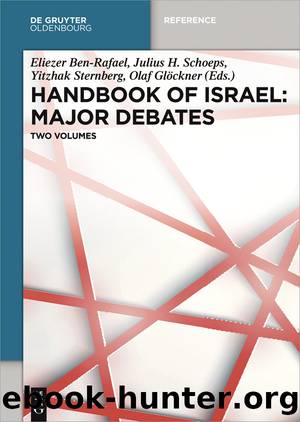Handbook of Israel by Eliezer Ben-Rafael

Author:Eliezer Ben-Rafael
Language: eng
Format: epub
Publisher: De Gruyter
Published: 2016-08-15T00:00:00+00:00
Israel as a liberal democracy
In addition to democratic procedures, liberal democracy has a set of the absolute values of equality, liberty, dignity, respect, justice and fairness. These values enable individuals to obtain self-autonomy and self-fulfillment and provide individuals and minorities protection against majority rule irrespective of who governs. Their aim is to prevent majority rule from turning into a “tyranny of the majority.” While procedural democracy furnishes freedom of choice of a ruling majority, liberal democracy is a tool to effectively contain the majority by constitutional individual rights and to prevent it from abusing power.
Israel boasts of being a liberal democracy and this self-appraisal is widely accepted by the international community and in the social sciences.271 The reality is more complex and less bright, however. Three structural constraints weigh down on Israel’s liberalism: permanent threats to national security impose restrictions on rights and freedoms; the authorization of religion to regulate personal status engenders religious coercion and gender inequality; and the Jewish and Zionist character of the state compromises the full citizenship and rights of non-Jewish citizens and precludes Israel from being and becoming an open society and state. These impediments to liberal democracy are further exacerbated by Israel’s nature as a deeply divided society in which ultra-Orthodox Jews and Arabs constitute dissident and non-assimilable minorities. Because the conflict with the Palestinians, the thorny issue of religion, and the divisive identity of the state are “wicked problems,” namely hard to resolve, the chances of maintaining good quality liberal democracy are not high, as elaborated next.
First, citizenship rights are non-constitutional and fragile because Israel lacks a constitution. The Knesset failed to enact a constitution after the proclamation of the state because it could not reach agreement on religious matters, and David Ben-Gurion, Israel’s founding prime minister, countenanced no restriction on his duty to ensure national security and to make fateful decisions. In the 2000s serious efforts were made outside and inside the Knesset to build a national consensus on a constitution but these could not overcome the resistance of the religious parties and other forces.272 Arab agreement was not pursued in earnest because it was and is considered virtually impossible. The moot question of state boundaries has been another hurdle. In the absence of a constitution, the Knesset has absolute power to legislate any law by a simple majority. A partial corrective is the legislation of a dozen “basic laws,” of which only two make a difference. These are “Basic Law: Freedom of Occupation” and “Basic Law: Human Dignity and Freedom.” Under the presidency of Aharon Barak, the Supreme Court seized upon these two laws of 1992 to challenge some discriminatory Knesset laws, to the dismay of illiberal national-religious, ultra-Orthodox and right-wing Jews. This so-called “constitutional revolution” is nevertheless shaky because there is no constitution and these two basic laws do not even entail the fundamental tenet of equality. Moreover, unlike Great Britain, Israel does not have a centuries-old democratic tradition that functions as a substitute for a liberal constitution.
The lack of a constitution enables various deviations from liberal democracy.
Download
This site does not store any files on its server. We only index and link to content provided by other sites. Please contact the content providers to delete copyright contents if any and email us, we'll remove relevant links or contents immediately.
| Africa | Americas |
| Arctic & Antarctica | Asia |
| Australia & Oceania | Europe |
| Middle East | Russia |
| United States | World |
| Ancient Civilizations | Military |
| Historical Study & Educational Resources |
Empire of the Sikhs by Patwant Singh(22172)
The Wind in My Hair by Masih Alinejad(4424)
The Templars by Dan Jones(4189)
Rise and Kill First by Ronen Bergman(4012)
The Rape of Nanking by Iris Chang(3516)
12 Strong by Doug Stanton(3057)
Blood and Sand by Alex Von Tunzelmann(2608)
The History of Jihad: From Muhammad to ISIS by Spencer Robert(2207)
Babylon's Ark by Lawrence Anthony(2070)
No Room for Small Dreams by Shimon Peres(1991)
The Turkish Psychedelic Explosion by Daniel Spicer(1988)
Gideon's Spies: The Secret History of the Mossad by Gordon Thomas(1950)
Inside the Middle East by Avi Melamed(1940)
The First Muslim The Story of Muhammad by Lesley Hazleton(1883)
Arabs by Eugene Rogan(1836)
Bus on Jaffa Road by Mike Kelly(1785)
Come, Tell Me How You Live by Mallowan Agatha Christie(1768)
Kabul 1841-42: Battle Story by Edmund Yorke(1649)
Citizen Strangers by Robinson Shira N.;(1535)
